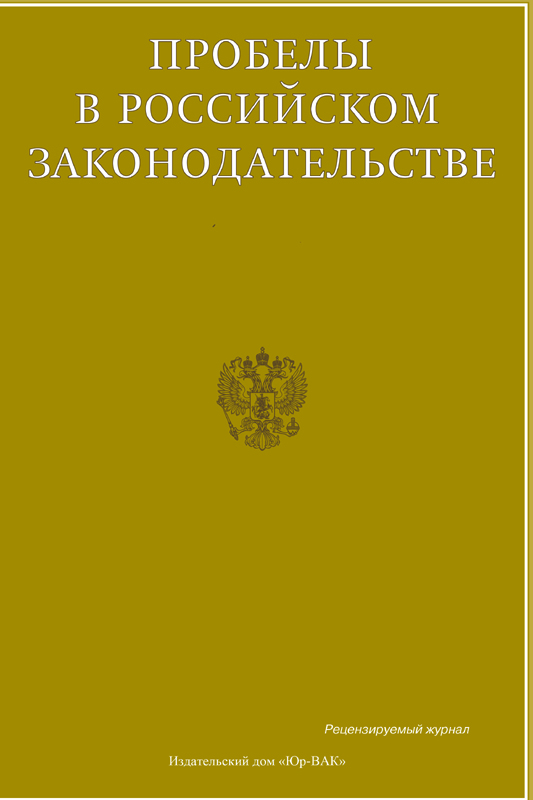Legal Regulation of Biomedical Experimental Research and Human Rights
- Авторлар: Volkova E.I.1, Khapsirokova E.A.1
-
Мекемелер:
- Russian State University of Justice (RSUJ)
- Шығарылым: Том 15, № 4 (2022)
- Беттер: 276-283
- Бөлім: Articles
- URL: https://journals.eco-vector.com/2072-3164/article/view/531730
- ID: 531730
Дәйексөз келтіру
Аннотация
The purpose of the research. The article examines the legal regulation of biomedical experimental research as a necessary condition for the implementation of such experiments in the field of treatment and prevention of diseases within the framework of human rights. International acts, the Constitution of the Russian Federation, and national legislation proclaim full awareness and the need for the voluntary consent of the persons participating in the experiment. Such restrictions are conditioned by the requirements of observance, protection and protection of human rights, respect for personal dignity, but do not exclude restrictions of such rights when certain circumstances occur. The aim of the study is to study the theoretical foundations of the legal regulation of biomedical experiments, legislative consolidation and judicial practice on the implementation of relevant legal norms at the national and supranational level, to determine the features of law enforcement on the example of vaccination with experimental vaccines against COVID-19. Results. As a result of the conducted research, the authors come to the conclusion that the expansion of the possibilities of biomedical experiments due to emergency circumstances (epidemics, pandemics, the threat of mass diseases and mortality) occurs in accordance with the accepted legal regulation. The authors believe that the state needs to take into account the cautious attitude of society towards biomedical experimental research in the form of vaccination with experimental vaccines, minimizing public and personal concern through further specification of regulatory regulations and law enforcement.
Толық мәтін
Авторлар туралы
Elena Volkova
Russian State University of Justice (RSUJ)
Email: gubanle@yandex.ru
associate professor of constitutional law Dapertment named after N.V. Vitruk Moscow, Russian Federation
Elena Khapsirokova
Russian State University of Justice (RSUJ)
Email: elena-adzinova@yandex.ru
Cand.Sci.(Law), associate professor of constitutional law Dapertment named after N.V. Vitruk Moscow, Russian Federation
Әдебиет тізімі
- Denisyuk N.B., Glushkov V.A. On the legal regulation of medical experiment. Clinical surgery. 1984. No. 6. p. 47.
- Soldatov A.A., Avdeeva Zh.I., Bondarev V.P., Merkulov V.A., Mosyagin V.D., Ivanov V.B., Gorenkov D.V., Khantimirova L.M. International and domestic regulatory recommendations for the development and registration of vaccines against COVID-19 in a pandemic. Biologics. Prevention, diagnosis, treatment. 2020. 20(4). Pp.228-244. - URL: https://doi.org/10.30895/2221-996X-2020-20-4-228-244
- Khapsirokova E.A. Protection of human rights in the field of biomedical experimental research. Legislation. 2020. № 5.
- Almutairi, AF (Almutairi, Adel F.), Almutairi, BM (Almutairi, Badriah M.), Alturki, AS (Alturki, Abdullah S.), Adlan, AA (Adlan, Abdallah A.), Salam, M (Salam, Mahmoud), Al-Jeraisy, MI (Al-Jeraisy, Majed I.), Balkhy, HH (Balkhy, Hanan H.). Public motives and willingness to participate in first-in-human clinical trials in Saudi Arabia: A new era in the making. JOURNAL OF INFECTION AND PUBLIC HEALTH. Sep-oct 2019. 12 (5). Pp.673-680.
- Aurey, X. The Nuremberg Doctors' Trial: Looking Back 70 Years Later. INTERNATIONAL CRIMINAL LAW REVIEW. 2017. 17 (6). Рp.1049-1069.
- Burt T, Dhillon S, Sharma P, Khan D, MV D, et al. PARTAKE Survey of Public Knowledge and Perceptions of Clinical Research in India. PLoS ONE. 2013. 8(7): e68666. doi: 10.1371/journal.pone.0068666.
- Chuchalin, AG. Consent. Modern interpretation: "Voluntary Informed Consent». TERAPEVTICHESKII ARKHIV. 2021. 93 (5). Pp.640-644.
- Gadgil D, Sengar M, Pramesh C S, Badwe R, Ranganathan P. Building research capacity in India: The Masters in Clinical Research program at the Tata Memorial Centre. Perspect Clin Res [serial online]. 2021 [cited 2022 Jan 11]. 12. Pp. 189-192.
- Gaille, M. For a new "Nuremberg Code": some contemporary issues of consent. M S-MEDECINE SCIENCES. Aug-sep 2019. 35 (8-9). Pp.603-604.
- Capron A.M. Where Did Informed Consent for Research Come From? J Law Med Ethics. 2018 March ; 46(1): Pp.12-29. doi: 10.1177/1073110518766004.
- Kim, J.H., Marks, F. & Clemens, J.D. Looking beyond COVID-19 vaccine phase 3 trials. Nature Medicine. 2021. 27. Pp.205-211. - URL: https://doi.org/10.1038/s41591-021-01230-y
- Lee, Jaeho. Study on consent of participants in clinical trials. KYUNGPOOK NATIONAL UNIVERSITY LAW JOURNAL. 2020. 69, Pp.175-197.
- Merz, JF. The Nuremberg Code and Informed Consent for Research. JAMA-JOURNAL OF THE AMERICAN MEDICAL ASSOCIATION. Jan 2 2018. 319 (1). pp.85-+
- Muller, M. Medical Ethics in the 70 Years after the Nuremberg Code, 1947 to the Present. WIENER KLINISCHE WOCHENSCHRIFT. Jun 2018. (130). Pp.S161
- Poli, L. International law as the "engine" of bio-law and the emergence of an "international biolaw». Biolaw journal-rivista di biodiritto. 2019. (2). Pp.287-301.
- Rotshild, V., Hirsh-Raccah, B., Miskin, I. et al. Comparing the clinical efficacy of COVID-19 vaccines: a systematic review and network meta-analysis. SCIENTIFIC REPORTS. Nov 23 2021. 11 (1). - URL: https://doi.org/10.1038/s41598-021-02321-z
Қосымша файлдар








